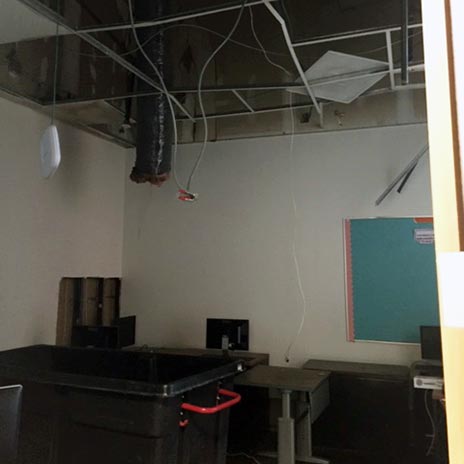Contact: Debra Dennis;
ddennis@dcccd.edu
For immediate release — March 5, 2021
(DALLAS) — When a torrent of ice and snow struck buildings across Dallas College, a group of brave souls worked tirelessly to make sure the campuses did not suffer catastrophic power outages and plumbing issues.
Facility workers are the unsung heroes who isolated leaks from broken pipes, extracted gallons of water and kept essential equipment from damage after last month's deep freeze that plunged Dallas into dangerous temperatures.
Of the 102 buildings that make up Dallas College, all were impacted to varying degrees, said Scott K. Wright, deputy chief of facilities management. He applauded maintenance and facility crews for their dedication and professionalism as they worked in dire conditions.
“Whether it was power outages or busted pipes, freezing pipes, roof leaks, sewer pipes freezing, low or no gas pressure — all were impacted in some form or fashion. Obviously, some buildings were impacted far more than others," Wright said.
It helped that officials had already declared a “snow day" that emptied Dallas College campuses of teachers, students and administrators. There is no preliminary estimate on damage caused by the severe winter weather, officials said.
At Eastfield Campus, snow and ice covered two parking lots that led to Parkland Hospital's COVID-19 vaccine drive-thru site. But the facility workers there were ready with an improvised plan to clear the snow.
“They didn't have snow removal equipment, so they utilized tractors normally intended for grounds maintenance," Wright said. Within several hours, the crew had the parking lots cleared ensuring the safety of the community. Eastfield also had other issues including an outside gas leak and flooding.
Maintenance Teams Worked More Than 20 Hours at El Centro
But it was El Centro Campus that sustained the most damage after a broken pipe gushed gallons of water onto each floor of the building.

Multiple burst pipes led to extensive damage at El Centro Campus.
“We were swimming upstream," said Jeremy McClelland, senior director of facilities at El Centro. “We had several big breaks."
Pipes do not break at the same time or in the same place.
The damage to El Centro was contained to the A Building, where pipes burst on several floors. The president's suite, human resources and business offices were all flooded.
McClelland and his team logged long hours to manage the leaks. A restoration company and contractors were hired to get the building cleaned, sanitized and operable before students and administrators are scheduled to return.
“It took about 20 hours from the time we got all of the leaks isolated and the restoration company onsite to get the water out of the building," McClelland said. “We had to isolate the leaks and then coordinate the teams that get everything dried up. “I've been [at the college] for over 10 years, and this was by far the worst damage I've ever seen."
Built in 1966, El Centro is Dallas College's oldest campus. The older construction brought more challenges for his crew, McClelland said. El Centro is more susceptible to the outside elements.
“But our crew is phenomenal," McClelland said. “They are selfless and always do whatever is required to serve our students, faculty and staff. Broken water pipes are part of the job."
Christopher Harmon said Mountain View Campus fared better during last week's storm but did experience some disruptions, including a broken air conditioning coil that led to a water leak in a cafeteria.
“We had a few things break, but it could have been worse," said Harmon, assistant director of facilities. “We were lucky. We had lost pressure and other things, but nothing like other buildings."
He credits Dallas College police for keeping his team informed as brutal temperatures tested the school's infrastructure.
Dallas College Police Chief Lauretta Hill said officers monitor buildings 24 hours a day and are the first line of defense.
“They're always there," Chief Hill said. “We got a lot of alarms, and that enabled us to contact facilities and let them know that we had identified issues.“
# # #